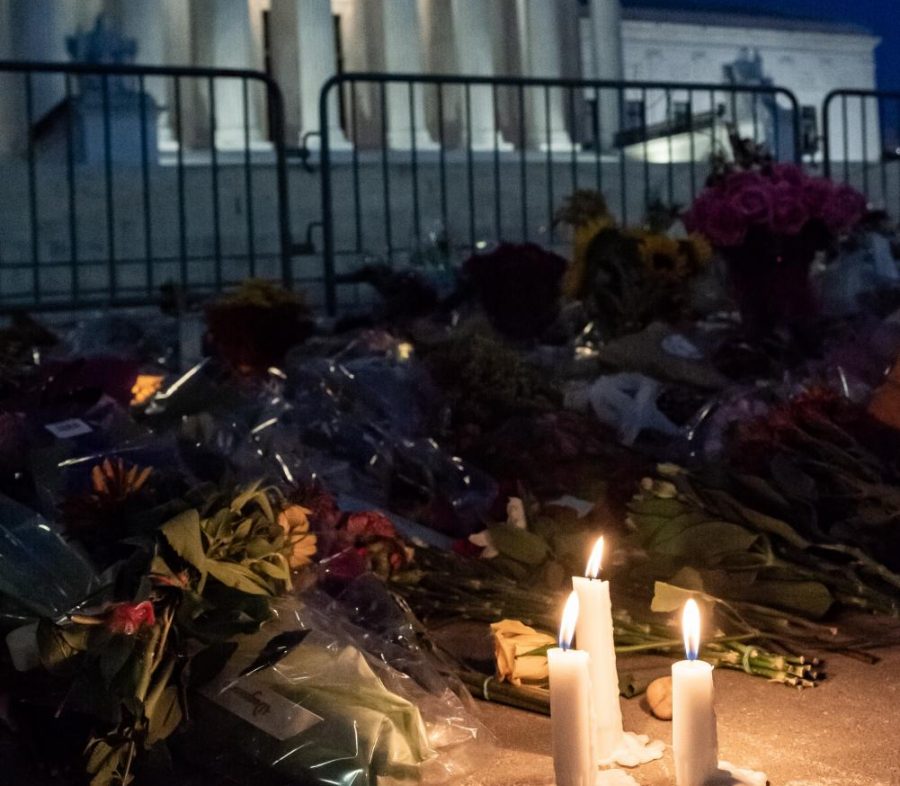OPINION: In faith, RBG will not rest in peace, nor power
Photo by Gayatri Malhotra on Unsplash
A candlelight memorial to Supreme Court Justice Ruth Bader Ginsburg rests outside the Supreme Court of the United States in Washington, D.C. Many mainstream memorials and well-wishes to RBG inadvertently overlook the central Jewish faith that Gingsburg held so dear.
October 29, 2020
A great tragedy struck the nation on Sept. 18 with the passing of 87-year-old Supreme Court Justice Ruth Bader Ginsburg. Ahead of her time, RBG broke ground and tradition on a wide swath of precedents, and left a legacy that opened countless doors for generations of women to come. Ginsberg undoubtedly was an incredibly respectable and influential force within the country and its courts.
Yet following her passing, as many went to pay respects to their fallen hero, they ended up doing the opposite of their intentions, erasing the central core of her being that was her Jewish faith.
Ginsburg attended Cornell undergraduate and later Harvard Law School as one of nine female students. Despite being the minority in what often felt like a hostile environment and caring for her young daughter and later her husband, Martin Ginsburg, following his cancer diagnosis, Ginsburg made the Harvard Law Review and graduated as one of the top students in her class. Though her academic record spoke wonders, following her graduation, Ginsburg was unable to find employment within any of the New York City law firms, due to her gender.
Such discrimation led her to establish the ACLU’s Women’s Rights Project, successfully arguing five cases before the US Supreme Court. Many of these cases, such as Reed v. Reed, which extended the protections of the Equal Protection Clause within the 14th Amendment, and Frontiero v. Richardson, which decided US military benefits could not differentiate solely on the basis of sex, helped to overturn some of the oppression women faced in the eyes of law. In 1993, President Bill Clinton nominated Ginsburg to the Supreme Court, where she continued to fight for equality and human rights until her death.
In the days after her death, however, I found myself scrolling through hundreds of “rest in peace” or “rest in power” posts about her, both of which are inherently Christian phrases that ignore the Jewish disbelief in an afterlife. This was only worsened by news clips in which “Amazing Grace” was blasted and sung outside of courthouses, and flowers left on court steps where rock should have been.
Ginsberg was unabashedly Jewish, embodying the Jewish value “Tzedek Tzedek Tirdoff,” or “Justice, Justice, you shall pursue.” She spoke often about how her faith motivated her to pursue justice for anyone regardless of circumstances, which makes it incredibly disheartening to see Christian values and rituals forced upon both her and her death.
While these gestures are in good faith, they are still disrespectful.
Another point of great distress for many Jews was the announcement that her corpse would lie in repose at the Supreme Court for at least two weeks. This is the same treatment that Justice Antonin Scalia received following his passing in 2016, and though the sentiment behind the gesture is wonderful, it disregards the Jewish tradition that the dead be buried within 24 hours of their passing, or in Ginsberg’s case about 72 hours due to the high holidays. While exceptions have been made to this rule, such as in Israel when influential Jewish political figures die allowing for a prolonged period of time before burial, this treatment should not be normalized for the passing of national heroes within the United States. The common practice of such a thing refuses to recognize the beliefs and practices of other religions, cultures and faiths, which is incredibly troubling in a country whose constitutional rights of freedom of worship Ginsberg fought so hard to defend.
Please do not tell her to rest in peace, and do not pay respects with unintentional disrespects. May her memory be both a blessing and a revolution — please treat it that way.


